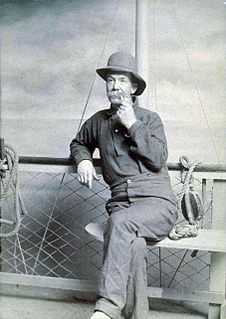Top 1200 Moral Failure Quotes & Sayings - Page 2
Explore popular Moral Failure quotes.
Last updated on April 21, 2025.
U.S. failures when it comes to the Gulf of Guinea are many: a failure to address the longstanding concerns of a government watchdog agency, a failure to effectively combat piracy despite an outlay of tens of millions of taxpayer dollars, and a failure to confront corrupt African leaders who enable piracy in the first place.
There did not have to be a moral. She need only show separate minds, as alive as her own, struggling with the idea that other minds were equally alive. It wasn't only wickedness and scheming that made people unhappy, it was confusion and misunderstanding, above all, it was the failure to grasp the simple truth that other people are as real as you. And only in a story could you enter these different minds and show how they had an equal value. That was the only moral a story need have.
God doesn't help. I think that's a knockdown argument. I think that it really shows that whatever moral knowledge we have and whatever moral progress we make in our knowledge or whatever progress we make in our moral knowledge is not coming really from religion. It's coming from the very hard work really of moral philosophy, of trying to ground our moral reasonings.
There can be, therefore, no true education without moral culture, and no true moral culture without Christianity. The very power of the teacher in the school-room is either moral or it is a degrading force. But he can show the child no other moral basis for it than the Bible. Hence my argument is as perfect as clear. The teacher must be Christian. But the American Commonwealth has promised to have no religious character. Then it cannot be teacher.
If you try to make interesting films, you're going to be disappointed most of the time. I choose just not to look at it that way. I don't look at American History X as a failure, or Fight Club as a failure, or 25th Hour as a failure, or Larry Flynt as a failure, or any of the movies that I care about that I've made that were not immediately successful. I'll stand with those movies any day over 90 percent of the movies that came out at the same time that made a hundred million dollars
Nothing fails like success, because we do not learn anything from it. We only learn from failure, but we do not always learn the right things from failure. If there is a failure of expectations, that is, if the messages that we receive are not the same as those we expected, we can make three possible inferences.
I think failure is nothing more than life's way of nudging you that you are off course. My attitude to failure is not attached to outcome, but in not trying. It is liberating. Most people attach failure to something not working out or how people perceive you. This way, it is about answering to yourself.
Perfectionist is sometimes the wrong word... It means like you're never satisfied, or you're upset by every single failure - any type of failure. And so for me, I don't look at failure as necessarily a bad thing as long as I'm able to learn from it and take something from it, so that next time I'm in that situation I know how to succeed.
We are now returning to the 18th century empirical approach with the new interest in the evolutionary basis of ethics, with 'experimental' moral philosophy and moral psychology. As a result, we understand better why moral formulas are experienced as ineluctable commands, even if there is no commander and even if the notion of an inescapable obligation is just superstition. So moral philosophy has made huge progress.
A failure remains a failure only if we refuse to learn from it. Any situation that teaches us greater humility, sobriety, wisdom about self and others, responsibility, forgiveness, depth of reflection, and better decision making -\-\teaching us what's truly important-\-\is not an ultimate failure. Sometimes what we deem a failure at the time it happens actually serves to foster a change within us that creates an even greater success down the road.
Novels are routinely denigrated when characters are not found to be likable. Is Raskolnikov likable? Is King Lear? The plethora of such naive readers testifies to a failure of imagination - the capacity to see into unfamiliar lives, motives, feelings - and this failure must, at least in part, be the failure of the teaching of literature in the schools.
Not many people are willing to give failure a second opportunity. They fail once and it is all over. The bitter pill of failure is often more than most people can handle. If you are willing to accept failure and learn from it, if you are willing to consider failure as a blessing in disguise and bounce back, you have got the essential of harnessing one of the most powerful success forces.
If an instrument similar to a geiger-counter could be invented that counted moral judgements instead, we would learn to duck as people became increasingly 'moral', since lethal force is usually imminent. So far from moral fervour being an alternative to force, it is frequently the overture, the accompaniment and the memorial to it.

























































